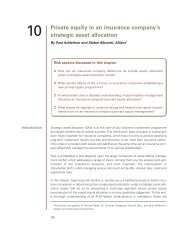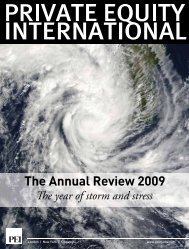Fundamentals of Private Equity and Venture Capital - PEI Media
Fundamentals of Private Equity and Venture Capital - PEI Media
Fundamentals of Private Equity and Venture Capital - PEI Media
You also want an ePaper? Increase the reach of your titles
YUMPU automatically turns print PDFs into web optimized ePapers that Google loves.
GETTING THE MOST OUT OF THIS MODULE<br />
Welcome to Module 3 in the <strong>Fundamentals</strong> <strong>of</strong> private equity series. This module<br />
focuses on structuring <strong>and</strong> raising a fund. It is designed to work both as a st<strong>and</strong><br />
alone section <strong>and</strong> as part <strong>of</strong> the whole series. It necessarily draws upon topics<br />
reviewed in earlier modules, <strong>and</strong> seeks to avoid repetition <strong>of</strong> their content.<br />
However, for the benefit <strong>of</strong> the st<strong>and</strong> alone reader, a comprehensive glossary has<br />
been incorporated, which explains the background <strong>and</strong> use <strong>of</strong> private equity terminology.<br />
All terms which may require explanation or expansion are printed in<br />
bold, to indicate that there is a glossary entry for them.<br />
Terminology<br />
It is difficult to avoid confusion in the use <strong>of</strong> generic terms such as management,<br />
investor <strong>and</strong> investment when discussing private equity at the fundraising level.<br />
The private equity fund is the core part <strong>of</strong> the process. It raises money from<br />
investors (who in turn are themselves managers <strong>of</strong> investment funds), <strong>and</strong> is managed<br />
by a private equity firm, <strong>of</strong>ten referred to as a general partner, but also as a<br />
manager or a management team. It then makes investments (hence becoming an<br />
investor) in private companies which in turn have their own management teams.<br />
We therefore need to be careful in our choice <strong>of</strong> terms for the various participants.<br />
By institutional investors, investors or limited partners, we mean the<br />
pension funds, insurance companies <strong>and</strong> the like who allocate capital to private<br />
equity funds. By private equity firm, fund manager or general partner, we<br />
mean the specialist teams who raise private equity funds <strong>and</strong> are responsible for<br />
making <strong>and</strong> managing investments in individual companies.<br />
Raising a new fund is an event <strong>of</strong> singular strategic<br />
importance for a private equity firm. The<br />
firm’s future is, in effect, placed into the h<strong>and</strong>s <strong>of</strong><br />
the institutional investors; the pension funds,<br />
insurance companies <strong>and</strong> endowment trusts<br />
whose capital allocation decisions, as we saw in<br />
Module 2, are a key influence in shaping the private<br />
equity industry. These investors will, by<br />
choosing whether or not to participate in the<br />
fund, either provide a m<strong>and</strong>ate for continued<br />
growth or cast a collective vote <strong>of</strong> no confidence<br />
from which very few managers will recover.<br />
The complexity <strong>of</strong> the fundraising process matches<br />
its strategic significance, as every aspect <strong>of</strong> the<br />
firm’s investment focus, track record, competence,<br />
people <strong>and</strong> processes is laid open to<br />
intense scrutiny <strong>and</strong> questioning. In many<br />
respects this represents a mirror image <strong>of</strong> the<br />
approach the private equity firm will itself use in<br />
appraising investment opportunities, although<br />
they differ considerably in detail.<br />
The combination <strong>of</strong> these two factors – the strategic<br />
importance <strong>and</strong> the extensive dem<strong>and</strong>s <strong>of</strong> the<br />
process – requires that the fundraising exercise is<br />
planned, launched <strong>and</strong> executed on the basis <strong>of</strong><br />
extensive research, a compelling business case<br />
<strong>and</strong> close attention to detail. This module<br />
reviews the process by starting with the strategic,<br />
commercial <strong>and</strong> marketing aspects before moving<br />
on to consider the various ways in which<br />
funds are structured <strong>and</strong> the terms under which<br />
they are managed.<br />
Fundraising – making the case<br />
Every year, more than 400 new funds are<br />
launched, 1 <strong>of</strong> which typically less than half reach<br />
a first close (i.e. raise the minimum amount<br />
required). Superficially this would indicate that<br />
the sheer volume <strong>of</strong> funds seeking capital will<br />
make it difficult for any single one to draw attention,<br />
<strong>and</strong> that there is a medium risk <strong>of</strong> failure.<br />
However, all funds – <strong>and</strong> geographies – are far<br />
COPYING WITHOUT PERMISSION IS UNLAWFUL<br />
THE FUNDAMENTALS OF PRIVATE EQUITY 5

















